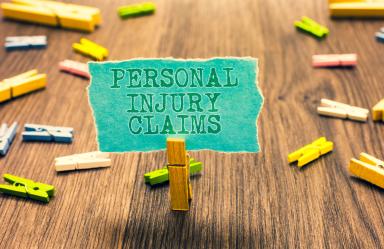Virginia Personal Injury Laws

If you have been injured in Virginia, make sure you do your due diligence and seek proper medical care before seeking legal advice. In this article, you will find information regarding specific personal injury laws for Virginia, liability guidelines for the state, as well as information regarding how much compensation can be received in a personal injury lawsuit, the statute of limitations in Virginia, and more.
Personal Injury Claims Against the Virginia Government
If you have suffered an injury in an accident that involves a government entity in Virginia, there are special guidelines and procedures that apply. Before the lawsuit can be filed, the entity must be notified of the intent to file the claim. You or your attorney can do this by submitting a formal notice to the state or local government entity. The notice must be in writing and include basic details of the incident. When the claim is against a city or town in the state, the notice must be sent within six months of the incident. If the claim is against the state government of Virginia, it must be sent within one year of the date of the accident. The entity will have a chance to respond to the notice by accepting it, attempting to settle it, or refusing it. After a response, a lawsuit can usually be filed.
Negligence Law in Virginia
When filing a personal injury lawsuit in the state of Virginia, you must be able to explicitly prove the other party’s negligence that caused the injury. By the state’s definition, “negligence” is the failure of the defendant to use ordinary care for the safety of another. If you can prove that your injury was caused by the negligence of another, you are entitled to receive compensation for your injuries, as well as damages and losses, as long as the suit is filed within a timely manner, and the injuries were not caused by your own negligence. According to the law, “the question of liability for negligence cannot arise at all until it is established that the man [person] who has been negligent owed some duty to the person who seeks to make him [them] liable for his [their] negligence.” There are, however, special rules that Virginia has when it comes to proving negligence and if the injured party has any share in the incident.
Virginia’s Shared Fault Rules
Virginia is one of the few states in the country that still uses the law of contributory negligence. This means that if an injured person is looking to pursue a lawsuit against someone, they must be able to prove that the other party is, without a doubt, 100 percent at fault for the incident and showed negligence that led to the injuries. If the plaintiff cannot prove that the other party is entirely responsible for the incident or if it is found that the plaintiff is partially responsible for their injuries, the plaintiff will not be able to receive any compensation for their injuries.
Most states have some sort of comparative negligence law, which means that even if the plaintiff shares a percentage of the blame for the incident that they still get the remaining percentage in compensation. For example, if the plaintiff was involved in a car accident and was seeking $100,000 in damages, but they were found to have shared 25 percent of the blame, the plaintiff would still receive $75,000 in compensation. According to Virginia’s contributory negligence law, however, that plaintiff would receive nothing in compensation, even if they were found to have a one percent share in the fault that resulted in the accident. If you or someone you know is looking to file a personal injury lawsuit in Virginia, it’s important to have your case, or theirs, reviewed by an attorney to see if this law plays a role in the case.
Virginia’s “One-Bite” Rule for Animal Injuries
Some states have specific rules when it comes to injuries caused by animals. In many states, their law states that if a dog or other animal injures a person, the owners are not held liable for only the first incident and if they can prove that their dog or animal has no prior history of aggressive behavior. This is often called a “one bite” rule. However, other states hold the owner of an animal liable for any injuries sustained by the animal. Virginia’s laws state that the owner of a dog or other animal is liable for injuries they cause to other people only if the injured party can prove that the owner should have known that the animal was dangerous or aggressive.
Virginia Business Liability Insurance Requirements
The state of Virginia does not require businesses to carry commercial liability insurance. This is because the state still utilizes the contributory negligence law described earlier. If a plaintiff is seeking compensation for an injury that occurred in a business, they will have to prove that the business was 100 percent negligent and that their negligence is what caused the accident and the injuries. Many businesses in Virginia still do carry liability insurance, though, in the case that an accident does happen, and they are the ones that are held responsible. The average coverage for businesses in Virginia is typically between $500,000 to $1 million. Virginia does require businesses to carry workers’ compensation coverage for any business that employs three or more people, and it doesn’t matter if the employees are full-time or part-time.
Virginia also requires all drivers to carry minimum auto insurance. If a business uses a car or truck for their business, they will typically carry a commercial vehicle insurance policy, as well as having the driver carry their own insurance policy. If you or someone you know is involved in an accident with a commercial vehicle, make sure you ask for both the driver’s insurance policy as well as the commercial vehicle policy.
How much can someone sue for in Virginia?
If you are planning to make a personal injury lawsuit in Virginia, it’s important to know how much you can seek in damages and compensation. In the state of Virginia, there is no cap on most standard personal injury cases. This means that the amount of both economic and non-economic damages that the plaintiff can receive in compensation is not limited under state law. There are two exceptions to this, however. The first exception is damages in medical malpractice cases. These are capped at $2 million in Virginia. The second exception is punitive damages, which are capped at $350,000. Punitive damages normally don’t come into play in the majority of personal injury cases since they require proof of either serious recklessness or malicious conduct that far exceeds ordinary negligence.
The Statute of Limitations in Virginia
While all states have a statute of limitations for personal injury claims, each state has different rules for the time limit to file the suit. Virginia’s statute of limitation for personal injury cases is two years from the date of the incident. It’s important to file the lawsuit in Virginia’s civil court system well within the two-year limit. If the deadline is missed and the lawsuit is still filed, it will almost certainly be thrown out. If the lawsuit is against a town or city in Virginia, a notice of the lawsuit has to be sent within six months from the date of the incident. Claims against the state government must have a notice sent within one year from the date of the accident. In both of those cases, the entity will respond, and the lawsuit can be allowed to be filed.
Expertise.com StaffAuthor
Step into the world of Expertise.com, your go-to hub for credible insights. We don't take accuracy lightly around here. Our squad of expert reviewers, each a maestro in their field, has given the green light to every single article you'll find. From rigorous fact-checking to meticulous evaluations of service providers, we've got it all covered. So feel free to dive in and explore. The information you'll uncover has been stamped with the seal of approval by our top-notch experts.




